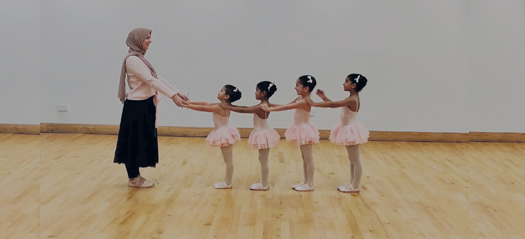
(Photo courtesy of Maisie Alexandra Byers)
Maisie Alexandra Byers studied ballet from a young age; she trained professionally at the Royal Academy of Dance, gaining a degree in Ballet Education and a Distinction in the Licentiate of the Royal Academy of Dance.
Having accomplished her Advanced 2 in Ballet and attaining the highest grade associated with the academy, Maisie worked across ballet schools in London and South England teaching and training students from early years to coaching at a professional level.
Maisie’s passion for choreography and teaching led her to work as a freelance choreographer, founding and directing a ballet company associated with the Royal Academy of Dance as well as developing her expertise in ballet education.
Maisie reverted to Islam and became passionate about offering ballet to the Muslim community in an artistic and unique way. Grace & Poise Academy was founded in 2019 as the world’s first Muslim ballet school with a Unique Ballet to poetry Syllabus.
The Academy is founded upon a passion for child development and raising the Muslim community to make a positive impact in the world.
How did the idea of Grace & Poise Academy come about?
As a revert to Islam, I felt passionate about making ballet accessible to the Muslim community and working in a way that accommodated my new faith but also allowed others to do the same.
The name ‘Grace& Poise’ refers to both the Islamic nature of having grace within our characters and poise in respect of our Islamic identity, but also the external grace and poise that comes with embodying an art form like ballet. Ultimately, our work aims to use ballet as a tool to better the whole self.
What feedback did you get from the community? Was there any objection against it?
Fortunately, we have had a lot of support from the community. We aim to work within the bounds of Islam and promote a positive Islamic identity formation. For example, we work with poetry rather than music as an inclusive way of working, and we have girls-only classes with female-only shows/events. We promote girls continuing ballet into adulthood in the way that we work for long life wellbeing.
For those that are talented and passionate about having a career in ballet, we offer teacher training programmes so students can become part of our teaching faculty and continue to pass on our work.
Many in the community have been very excited about embracing the art form of ballet within the bounds of Islam and about forming our own paths for our community to thrive.
What’s your response to claims that ballet without music is pointless?
I believe it would be poignant to explore the benefits of ballet in its traditional form and look at the way in which we work to see how the same benefits are met.
For example, ballet in its traditional form encourages physical strength, stability, coordination, good posture and alignment; it promotes flexibility and mobility and is proven to support physical long life wellbeing. This is exactly the same for us at Grace & Poise Academy, as ‘ballet’ has not changed its physical form.
Ballet with music would aim to inspire creativity, interpretation and artistry, and when we use poetry, we are allowing children to connect with narratives and meaning which supports their cognitive development and inspires creativity and artistry in its own way.
Our students are able to explore emotionally by communicating stories told through their movements and facial expressions.
As an educator and having worked with music for years before establishing Grace & Poise Academy I believe our work has endless benefits, and we are proud to celebrate it as an art form in its own right.
You have four locations in London, is there a demand to expand elsewhere in the country?
Yes, there is a high level of demand from across the UK and beyond, and we are very grateful to have an opportunity to try to benefit many children. We look forward to expanding in the future, Insha’Allah.
Why does ballet have a reputation as an elitist and classist art form and should be done to counter that perception?
In the same way, any subject studied as an extracurricular activity requires funding from parents to support, and ballet is no exception.
We currently offer ballet in the curriculum within PE in Islamic schools for early years, as part of our outreach programme. A high level of the students we work with come from socioeconomic backgrounds and ballet typically wouldn’t be something they can access.
We are very keen to expand this work, and the biggest challenge schools face is funding. However, we are looking to find ways to support schools as best we can. It’s invaluable for students at these schools that companies like ours are able to offer students these experiences to raise their prospects.
By being exposed to various activities, they gain transferable skills that will enrich their learning and enhance their CV’s and applications for any further study.
Through this enrichment, children will be better equipped to gain higher qualifications and therefore better jobs and as a result, increase their socioeconomic position within society.
Ultimately, I believe that through education we can provide the tools individuals need to best help themselves, and holistic education is something that I believe is hugely emphasised within Islam.
How has the pandemic affected your classes, and how have you adapted?
We did take our classes on zoom for existing students for a time and are now grateful to have reopened as normal.
Our classes are fortunately busier than ever and especially in a time of emotional difficulty for children we are seeing how needed our work is to create spaces for children to express and explore themselves.
Interview by Elham Asaad Buaras